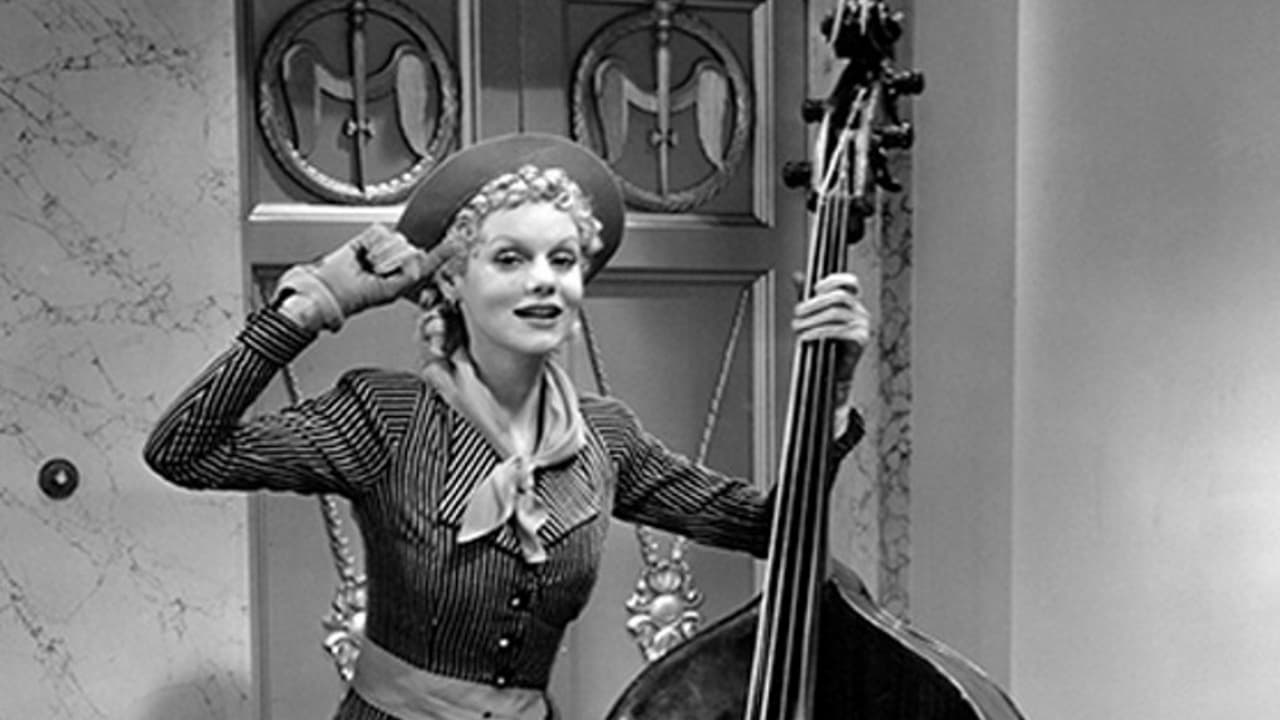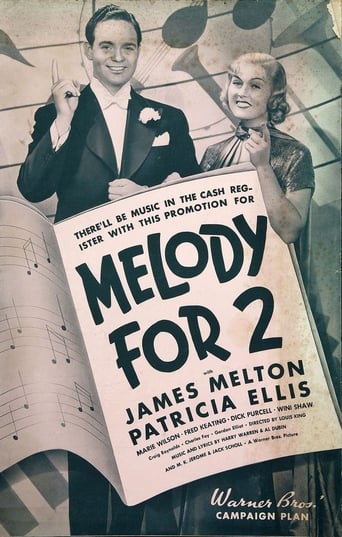

Slow pace in the most part of the movie.
... View MoreSelf-important, over-dramatic, uninspired.
... View MoreIt’s fine. It's literally the definition of a fine movie. You’ve seen it before, you know every beat and outcome before the characters even do. Only question is how much escapism you’re looking for.
... View MoreThe movie really just wants to entertain people.
... View MoreThis, the third and last of of James Melton's three Warner Brotheres movies, gives some idea of why that studio did not renew the tenor's contract.There are other things wrong with this movie, certainly. The script is lame and seems downright telegraphed at times, perhaps explaining why the movie is only 60 minutes long. (The fact that there are cast members in cast lists who do not appear in the picture suggests that significant chunks of the script were either never filmed, or, less likely, filmed but not used.) But there are lots of popular 1930s musicals with weak scripts, so that is not the real culprit here.Some of the musical numbers are forgettable, certainly, but "A Flat in Manhattan" (sung by Patricia Ellis), "Dangerous Rhythm" and "An Excuse for Dancing" (both performed by Winifred Shaw, who sings wonderfully here), and especially "September in the Rain" (by Harry Warren and Al Dubin, sung very well by Melton) are pleasant enough. One of the problems with the movie is that, because it is so short, these better numbers don't get repeated in a way to sell them. Most just sort of come and go, especially "September in the Rain," even though it went on to be a hit anyway.The real problem, for me, is that none of the actors creates an interesting character. Melton in particular has a problem in this department. He seems angry throughout most of the picture, and that doesn't make for an endearing romantic lead. Nor does he get any good romantic scenes with either of the two female leads. The role is wrong for him, and does not present him in an appealing light. What was the point of making a lyric tenor take the part of a stubborn band leader?I don't know that the end of his movie career is a particular shame. After his three-picture stint in Hollywood, Melton went on for another 15 or so years on radio and records, quite successfully, and evidently eventually nightclubs, an understandably popular singer with a mellifluous John MacCormack-type lyric tenor. The fact that he did not make a success of it in Hollywood probably didn't deprive us of any important pictures, given the sorts of things other such tenors were put in in those days. (Think Allan Jones, for example.)There's really not much to recommend in this picture. If you hear the better songs, you've probably had the best of it.
... View MoreMELODY FOR TWO (Warner Brothers, 1937), directed by Louis King, is a 60 minute musical programmer starring James Melton in his third and final leading role for the studio. Following STARS OVER Broadway (1935) and SING ME A LOVE SONG (1936). Melton, an accomplished opera singer, was one of those talents who failed to register as a screen personality. After the release of MELODY FOR TWO, it was three strikes and out. Melton plays Tod Weaver, a band-leader working at the Sky Terrace, "America's most exclusive club" of New York City. Gale Starr (Patricia Ellis), his girlfriend, performs as the band's vocalist. Because his contract arrangement has run out two months ago and not been renewed, Mel Lynch (Dick Purcell), Tod's arranger whose real interest is Gale, insists on a new contract of $500 a week and a bonus of $1,000. Tod refuses and has Mel fired. William Hallam (Craig Reynolds), the night club manager, unhappy with that decision, feels his club could face financial ruin. Gale's idea is to have Hallam pay Tod the $1,000 himself to give Mel for his musical arrangements. When Tod learns of this after reading Walter Wilson's (Gordon Elliott) newspaper column, he walks out on his contract, ending up being suspended by the National Band Association, with Gale assuming Tod's role as band-leader. "Remorse" Rumson (Fred Keaton), publicity man, assisted by "Scoop" Rumson (Charley Foy), press agent and former hoofer, arranges for Tod's comeback by having him lead the band at the Green Mill, with Lorna Gray (Winifred Shaw) as new singer with Camille Casey (Marie Wilson), Rumson's girl from Hoboken, playing the bass. Because their music has failed to pack the house, it takes Exodus Johnson (Eddie Anderson), a janitor from Harlem, to improve their method by introducing them to something called "swing" music that he's written. With Lorna now singing "hot," the swing music proves very profitable for the French accented Alex Montrose (Eddie Kane), manager of the Green Mill, attracting more patrons than the Sky Club, having Tod and Gale compete against each other and issues upon their auditioning for an upcoming radio show. For the motion picture soundtrack, new songs by M.K.Jerome and Jack Schroll include: "A Flat in Manhattan" (sung by Patricia Ellis); "Melody for Two" and "Macushola" (both sung by James Melton); "Dangerous Rhythm" and "An Excuse for Dancing" (both sung by Winifred Shaw); "September in the Rain" (by Harry Warren and Al Dubin, sung by Melton); "Jose O'Neil, the Cuban Heal" (sung by Winifred Shaw); "An Excuse for Dancing" (sung by Patricia Ellis); and "Melody for Two" (Sung by Melton).The songs in MELODY FOR TWO are as forgettable as the story itself, with production looking more like a product from Republic Studios or even Grand National than Warner Brothers. Winifred Shaw, in her final screen role, whose introduction to such great tunes as "Lullaby of Broadway" and "The Lady in Red" from 1935's GOLD DIGGERS OF 1935 and IN CALIENTE respectively, sings nothing worth noting this time around. Due to tight editing, Shaw's role, along with several others in support, happens to be one of those come and go type performances. She's initially seen singing in the band towards the second half of the story, with no introduction to her character whatsoever. She disappears as quickly as she came. Her only noteworthy scene in the story department comes as she attempts to attract the attention of her band-leader boss (Melton) with a seductive kiss, to immediately slap his face for reasons only known to her and not the viewer. Shaw sings three melodies here, taking the spotlight in Spanish attire to "Jose O'Neil, the Cuban Heal," and at one point, reflects upon a young Ethel Merman. Patricia Ellis is basically a more sensible character as opposed to Melton's stubbornness. Her brief scene as the camera captures her leading waving the stick leading the band is reminiscent to Ina Ray Hutton, one of the relatively few female band-leader's of that time. For her second role opposite Melton, Ellis sings a little but carries the plot such as it is with ideas as to how to improve herself and the band's performance. Melton's only worthwhile song is "September in the Rain," originally written for his debut film "Stars Over Broadway," is one of the few high-points next to Eddie Anderson, the future "Rochester" of the Jack Benny radio and TV programs, using his "Excuse for Dancing" at one point. Supposedly reported as Donald O'Connor's film debut, he's non-existent in the final print. MELODY FOR TWO makes no high demands on acting and storytelling, but no harm done either way for classic movie fans whenever this rarely seen Warner Brothers musical turns up on Turner Classic Movies.(**)
... View MoreEven if you like musicals (and I do), don't bother with this bit of tripe. Suffice it to say, it's short, and that's about the only thing to recommend it. The acting is horrendous, the singing, highly mediocre, and the music itself is especially abysmal tripe, with nary a hummable tune in sight (just a lot of forgettable schlock). Add to this all the dull direction and production and this comes out as a total waste of time, albeit a short time. I gather the leading man went on to become an opera star. Well, he's certainly ugly, fat, and totally lacking in any acting talent, so I'm not surprised he did. 99% of all opera singers can't act and he is no exception. And Warren and Dubin must have been scraping the bottom of the barrel for the music delivered here. Though never the caliber of a Berlin, Gershwin, Arlen, etc., they did write a few memorable tunes, but you won't find any of them here.
... View MoreIn the barely one hour running time of Melody for Two a whole lot of musical numbers gets packed into it. So much so that unfortunately a lot of plot gets sacrificed. When I saw that Donald O'Connor was supposed to be in Melody for Two it confirmed my suspicions that a lot got left on the cutting room floor. Who knows if O'Connor had actually appeared in Melody for Two and had gone to Warner Brothers how much different a career path he might have had.James Melton and Patricia Ellis lead rival bands. In fact when the film starts out she's the female vocalist in his band. But when he gets into a stupid fight with his arranger and quits the club he's contracted for, she steps in and takes over the band.Not to be outdone Melton goes out and hires himself an all female orchestra. Both of them get into the latest of crazes, swing music and turn professional rivals.Right after this Melton left Warner Brothers and went on to grand opera and eventually became the lead tenor at the New York Metropolitan Opera in the Forties. But in this final Warner Brothers film, he introduced and popularized the song, September in the Rain.Harry Warren and Al Dubin had originally written this for Melton's first Warner Brothers film, Stars Over Broadway, but it was cut, though you can hear it in the background. In Melody for Two Melton got to sing it and it became a big hit in 1937, one of Warren and Dubin's biggest. Melody for Two is good easy to take entertainment. Look for Wini Shaw to also have a good number or two in it and Marie Wilson as the seemingly dumb bass fiddle player who comes up with the two ideas that change some personal history.
... View More